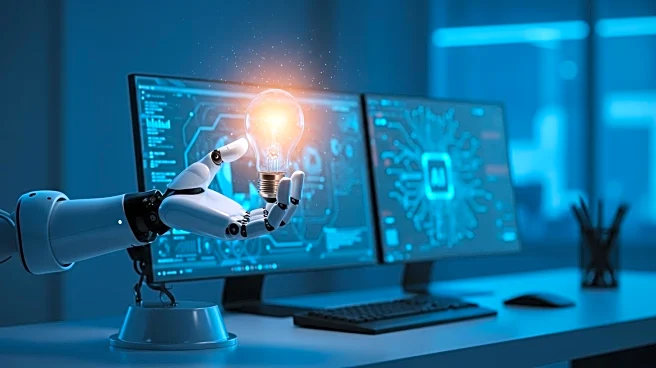What's Happening?
The Trump administration has initiated a public-private approach to integrate artificial intelligence (AI) into K-12 education, aiming to enhance personalized learning. This move has sparked debate among educators and policymakers, with critics emphasizing the need for adequate teacher training and preparation. The initiative follows a similar effort in South Korea, where AI textbooks were reclassified as supplementary materials due to pushback from teachers who felt unprepared. In the U.S., President Trump signed an executive order to establish an AI task force to promote AI literacy in classrooms. However, concerns persist about the lack of evidence supporting AI's impact on student achievement. A survey by Gallup and the Walton Family Foundation found that while some teachers reported positive outcomes from AI tools, there is no consensus on their use in schools.
Why It's Important?
The integration of AI in education is significant as it could transform teaching methods and student learning experiences. However, the initiative's success hinges on proper teacher training and support, which critics argue is currently insufficient. The debate highlights the broader issue of balancing technological advancement with educational efficacy. If implemented effectively, AI could equip students with skills relevant to the workforce, addressing the growing demand for AI literacy. Conversely, inadequate preparation could undermine educational outcomes and increase teacher workloads. The initiative also raises concerns about potential job displacement due to AI, emphasizing the need for durable skills like communication and critical thinking.
What's Next?
The Trump administration's AI task force is expected to establish partnerships with industry organizations to further AI literacy in education. As the initiative progresses, stakeholders will likely focus on developing comprehensive teacher training programs to ensure effective implementation. Policymakers and educators may also explore strategies to mitigate potential job displacement caused by AI, emphasizing the importance of equipping students with versatile skills. The ongoing debate will likely influence future educational policies and the role of technology in classrooms.
Beyond the Headlines
The push for AI in education reflects broader societal shifts towards digital innovation and automation. As AI becomes more prevalent, ethical considerations regarding data privacy and the role of technology in learning environments will emerge. The initiative also underscores the need for inclusive educational practices that consider diverse student needs and learning styles. Long-term, the integration of AI could redefine traditional educational models, prompting discussions on the balance between human and technological instruction.









